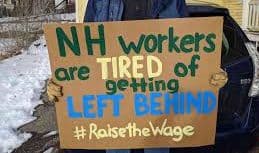The most recent effort to increase the minimum wage in New Hampshire was put down this month in the Republican-led Senate by a vote of 14-10. The bill would have set the rate at $10 per hour starting in January and then increased it to $12 two years later.
New Hampshire currently doesn’t set its own minimum wage. Instead, the state follows the federal minimum which has been $7.25 per hour since 2009.
President Joe Biden has proposed increasing it to $9.50 this year and, in steps, to $15 an hour in 2025; increasing pay for 17 million Americans and pulling nearly one million out of poverty.
The Providence Journal reports that opponents argue that a $15-an-hour minimum wage could force businesses to forgo hiring, lay off workers, or cut pay in order to maintain profitability.
Supporters say moderate increases in the minimum wage reduce poverty without resulting in detectable job losses.
About 39 million people earned less than $15 in 2019. Black and Hispanic-Latino women are more than twice as likely as White men to fall into this low-wage category, and their share of the low-wage workforce has increased even as the U.S. economy enjoyed its longest expansion in history, reports The Washington Post.
Hispanic-Latinos are overrepresented in low-wage jobs. At almost every age, Hispanic-Latino men and women are more likely to be doing low-wage work than their White friends.

Hispanic-Latino workers are also overrepresented in many of the occupations with the highest share of low-wage workers, particularly in agriculture and cleaning. Whites make up a majority of the workforce, but a minority of those in many low-wage occupations.

“Minimum wages disproportionately benefit women and people of color because they are paid such poor wages otherwise,” said EPI economist and minimum-wage expert Ben Zipperer to The Washington Post. “Infrequent and inadequate increases to the minimum wage over the last few decades have to some degree aggravated racial pay gaps,” he added later.
Economists at Morgan Stanley concluded, “the impact to employment, positive and negative, would be minimal, while the social benefits lifting real wages of lower-income earners and millions out of poverty are substantial.”
It is estimated that as many as 32 million Americans — particularly Black and Hispanic-Latino women — would gain from a $15 minimum wage.
Cover Photo Credit: Manchester Ink Link




